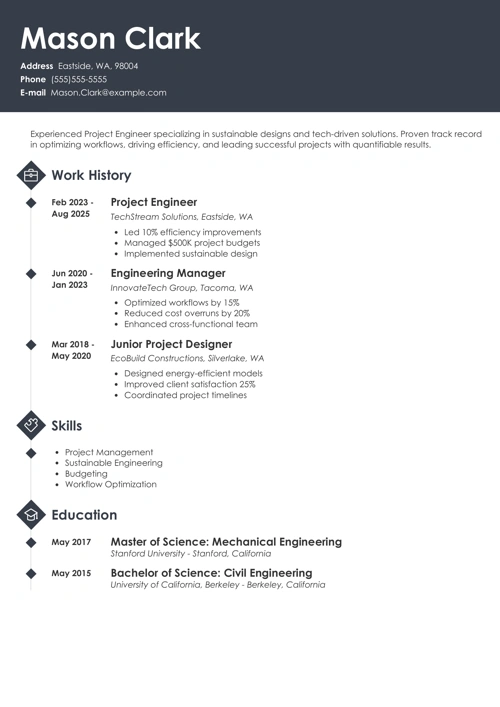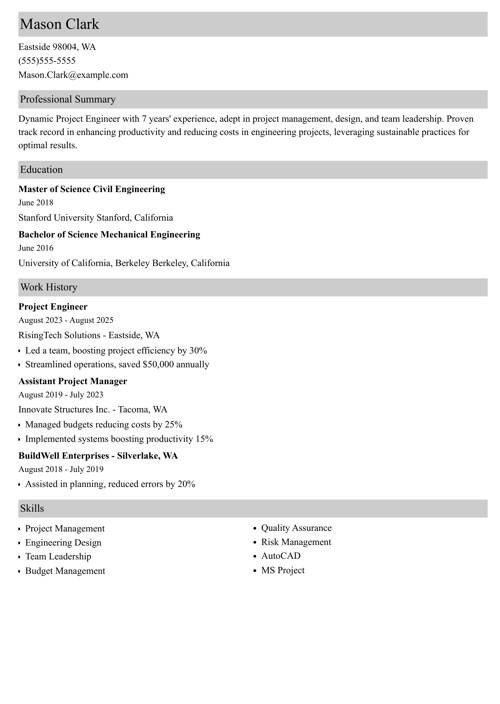As a project engineer, you excel at managing complex projects and solving problems. But how do you make your resume stand out in a crowded job market? It’s not about flashy formats or elaborate designs—it's about clearly highlighting your skills and achievements. In this article, you'll find expert tips and examples to craft a compelling project engineer resume that effectively showcases your expertise and helps you shine.
This guide will show you:
- A project engineer resume example that’s better than 9 out of 10 other resumes.
- How to write a resume for a project engineer that will land you more interviews.
- Tips and examples of how to put skills and achievements on a project engineer's resume.
- How to describe your experience on a resume for a project engineer to get any job you want.
Want to save time and have your resume ready in 5 minutes? Try our resume builder. It’s fast and easy to use. Plus, you’ll get ready-made content to add with one click. See 20+ resume templates and create your resume here.
Sample resume made with our builder—See more resume examples here.
One of our users, Brittanya, had this to say:
Zety really helped me create the best resume possible. It pointed out how things could be better on my existing resume and suggested many things to be re-worded or removed.
Want to check more samples related to the project engineer? Here you go:
- Computer Engineering Resume Example
- Database Developer Resume Example
- Engineering Resume Example
- Engineering Manager Resume Example
- Engineering Project Manager Resume Example
- Mechanical Engineer Resume Example
- Process Engineer Resume Example
- Senior Software Engineer Resume Example
- Software Engineering Resume Example
- Systems Engineer Resume Example
Project Engineer Resume Sample
Mason Clark
Project Engineer
mason.clark@email.com
321-654-9870
linkedin.com/in/masonclarkprojects
Summary of Qualifications
Detail-oriented and results-driven Project Engineer with over 7 years of experience managing large-scale construction projects. Expertise in cost estimation, risk management, and team leadership. Proven ability to deliver projects on time, within budget, and in full compliance with safety and quality standards. Known for improving operational efficiency and achieving cost savings of up to 20% across multiple projects.
Work Experience
Project Engineer
Silverstone Construction, Manchester, NH
March 2018–Present
Key Qualifications & Responsibilities
- Managed multiple infrastructure projects, including commercial buildings, bridges, and roadways, from planning through to completion.
- Coordinated cross-functional teams, subcontractors, and stakeholders to ensure timely delivery of projects within scope.
- Controlled project budgets and schedules, leading to a 10% reduction in overall costs.
- Led a team of engineers and contractors to streamline processes, improving productivity by 15%.
- Developed and implemented a comprehensive risk management framework, minimizing delays by 25%.
Key Achievements
- Led the successful construction of a $15M office complex, completing the project 3 months ahead of schedule and 5% under budget.
Assistant Project Engineer
Precision Engineering Solutions, Boston, MA
July 2015–February 2018
Key Qualifications & Responsibilities
- Assisted in the execution of major infrastructure projects, including highway expansions and commercial developments.
- Supported senior engineers with cost estimation, scheduling, and ensuring quality control across multiple projects.
- Managed project documentation, ensuring compliance with safety regulations and local building codes.
- Contributed to the delivery of a $30M highway expansion, meeting all project specifications and environmental requirements.
Key Achievements
- Contributed to the timely and successful completion of a $30M highway expansion project, within budget and regulatory requirements.
Education
Bachelor of Science in Civil Engineering
University of Michigan, Ann Arbor, MI
September 2010–May 2015
Certifications
- Chartered Engineer (CEng), American Society of Civil Engineers (ASCE), 2019
- Project Management Professional (PMP), Project Management Institute (PMI), 2020
- OSHA 30-Hour Construction Safety Certification, 2017
Skills
- Project Management & Scheduling
- Construction Design & Planning
- Budgeting & Cost Control
- Risk Management & Mitigation
- Team Leadership & Coordination
- Quality Assurance & Safety Compliance
- Client & Stakeholder Communication
- AutoCAD, Revit, Microsoft Project
- Site Safety Management
Awards & Recognition
- 2019, Outstanding Project Leadership Award, Silverstone Construction
Memberships
- Member, American Society of Civil Engineers (ASCE), 2016–Present
Languages
- English – Native
- German – Intermediate
Here’s how to write your own project engineer resume:
1. Format Your Project Engineer Resume Correctly
In the competitive field of project engineering, the design of your resume plays a crucial role. Hiring managers sift through countless applications, so you need a resume that grabs attention immediately. Achieve this by utilizing a good resume format that exudes professionalism and clarity.
To format your resume for project engineer positions:
- Begin with a well-structured resume header. This should include your name, phone number, email, LinkedIn profile, and a link to your online portfolio. These are the essential contact details to feature prominently.
- Include your city only if it matches the company’s location. It’s okay to omit your street address.
- Opt for a reverse-chronological resume, which lists your most recent job first. This layout is preferred by hiring managers due to its familiarity.
- Select a professional font such as Calibri or Arial, keeping the font size between 10 and 12 points.
- Save your resume for a project engineer as “Your Name - Project Engineer - Resume.pdf.” Using a PDF format ensures your layout remains intact across devices.
- Stick to the optimal resume length, which is one page for entry-level candidates. However, if you have extensive experience, a two-page resume may be appropriate.
Read more: Should You Make a Two-Page Resume?
2. Customize Your Project Engineer Job Description
Why is it important to customize your resume for each job application? Generic work experience sections often fail to capture the attention of hiring managers. When they see a list of generic duties of a project engineer, they might think, “This person was a project engineer, but how effective were they?”
Here’s how to incorporate relevant experience into your resume:
- Use the job title exactly as it appears in the job listing. ATS systems favor precise job titles.
- Include the company name and your employment dates, followed by 3–6 bullet points. Highlight more details for recent roles, less for older ones.
- Demonstrate your skills by focusing on accomplishments. The best achievements are quantifiable and reflect KPIs.
- Initiate sentences with powerful action verbs such as coordinated, designed, and prepared.
Project Engineer Resume Examples—Responsibilities
- Oversee project planning, scheduling, and execution to ensure timely completion within budget.
- Coordinate with cross-functional teams to align project goals, deliverables, and resources.
- Develop and manage project documentation, including plans, specifications, and reports.
- Conduct risk assessments and implement mitigation strategies to address potential issues.
- Monitor project progress, track milestones, and provide regular updates to stakeholders.
- Ensure compliance with safety regulations, quality standards, and industry best practices.
- Manage project budgets, including cost estimation, tracking expenditures, and controlling costs.
Remember to use action verbs that convey your responsibilities and achievements effectively. Here are some action verbs to use in a resume for a project engineer:
Project Engineer Resume Examples—Action Verbs
- Led
- Coordinated
- Analyzed
- Managed
- Developed
- Supervised
- Optimized
- Designed
- Facilitated
- Executed
Did you know a past promotion can land the interview? Read more: How to Show a Promotion on a Resume (or Multiple Positions)
3. Make Your Education Section Count
Simply listing your educational background on a resume isn't enough. Think of your education section as a tool to highlight skills and accomplishments, not just degree titles and institutions. This approach can significantly boost your interview prospects.
Consider these resume tips:
- Position your degree information right after your work experience.
- For entry-level candidates, include relevant coursework to demonstrate your skills.
- For those with experience, include any fellowships, scholarships, or leadership roles in bullet points.
- Debating whether to include your GPA? If it's impressive, go ahead and list it on your resume. More details on including GPA on a resume.
Read more: How to List Your Major and Minor on a Resume
Creating a resume with our builder is incredibly simple. Follow our step-by-step guide and use content from Certified Professional Resume Writers to have a resume ready in minutes.
When you’re done, Zety’s resume builder will score your resume and our resume checker will tell you exactly how to make it better.
4. Prove the Project Engineer Skills the Company Wants
Highlighting your skills on a resume is crucial, but there's an art to it. Aiming for 5–10 key project engineer skills ensures focus and relevance. Instead of a broad approach, target the skills highlighted in the job description.
Here's how to add project engineer skills to a resume:
- The skills they list in the ad are resume keywords. Add them to the short list in your resume.
- Don’t list too many skills (like 20). If you do, the skills the employer wants will get lost in the shuffle.
- To overload your interview count, make sure the skills in your list also appear in your job and education bullet points.
Here are some hard skills for a resume for project engineers, with soft skills at bottom:
Project Engineer Resume Skills
- AutoCAD
- Project management skills
- Math
- MATLAB
- Structural design
- Physics
- STADD Pro
- Civil3D
- Setting project objectives
- Scheduling
- Progress monitoring
- Project coordination
- Interpersonal skills
- Verbal and written communication skills
- Leadership skills
- Organizational skills
- Active listening
- Problem-solving skills
- Time management skills
- Attention to detail
- Stress management
- Teamwork skills
- Computer skills
- Adaptability
Read more: What is the Difference Between Hard Skills and Soft Skills?
5. Add Other Sections to Your Project Engineer Resume
Hiring managers are often curious about what it would be like to work with you. Are you proactive and ready to tackle challenges? Adding extra sections to your project engineer resume can demonstrate your strengths and potential to be a valuable team member.
Consider including the following additional sections to showcase your qualifications:
- Highlight any certifications relevant to the role, such as AutoCAD or HAZWOPER.
- If you've authored articles for publications like ASME Magazine, list them to show your expertise.
- Mention memberships in professional organizations like ASME, which indicate your engagement and involvement in the engineering field.
- Include any volunteer engineering projects you've participated in, as they can highlight your practical skills. Here's how to list volunteer work effectively.
- If you speak additional languages that are useful to the company, add these language skills to your resume.
Read more: What Are the Correct Sections of a Resume?
6. Write a Project Engineer Resume Summary or Resume Objective
Capturing a hiring manager's attention quickly is crucial, as studies show they spend mere seconds on an initial resume scan. Make those seconds count with a resume introduction that distills your most impressive achievements.
A concise resume profile can do wonders. Think of it as a mini elevator pitch of yourself that succinctly highlights your value. Your goal is to engage the reader with a brief yet impactful paragraph.
If you bring a year or more of experience to the table, emphasize your job title, your potential contributions to the company, and a few notable achievements. This is your resume professional summary, and it belongs right at the top.
For those crafting a project engineer resume with no experience, the approach is similar, but your standout achievements should stem from academic or personal projects. In this case, you're crafting an objective for a resume.
87% of hiring teams use LinkedIn to find new hires. See our guide: How to Upload a Resume to LinkedIn (Update & Add)
7. Write a Cover Letter for Your Project Engineer Resume
Creating a standout cover letter can significantly enhance your job application. Many candidates overlook this opportunity to express their enthusiasm and dedication to a specific company. A well-crafted cover letter demonstrates that you're genuinely interested in the position and have taken the time to tailor your application.
To construct an effective cover letter:
- Start with a professional format, using the same header as your resume and ending with a formal sign-off.
- Keep it concise, typically between 3–5 paragraphs, and ensure it's no longer than one page.
- Begin by mentioning the job title and include a compelling opener to grab attention.
- In the body, highlight major project engineer achievements that align with the job description.
- Conclude with a strong closing statement that reiterates your interest and invites further discussion.
- Follow up with a polite email to reinforce your interest and remind them of your application.
Read more: How to Write a Cover Letter for a Job
Plus, a great cover letter that matches your resume will give you an advantage over other candidates. You can write it in our cover letter builder here. Here's what it may look like:
See more cover letter templates and start writing.
Your project engineer resume is your ticket to a rewarding career. Approach it with creativity and precision, and you'll open doors to opportunities.
About Zety’s Editorial Process
This article has been reviewed by our editorial team to make sure it follows Zety's editorial guidelines. We’re committed to sharing our expertise and giving you trustworthy career advice tailored to your needs. High-quality content is what brings over 40 million readers to our site every year. But we don't stop there. Our team conducts original research to understand the job market better, and we pride ourselves on being quoted by top universities and prime media outlets from around the world.





